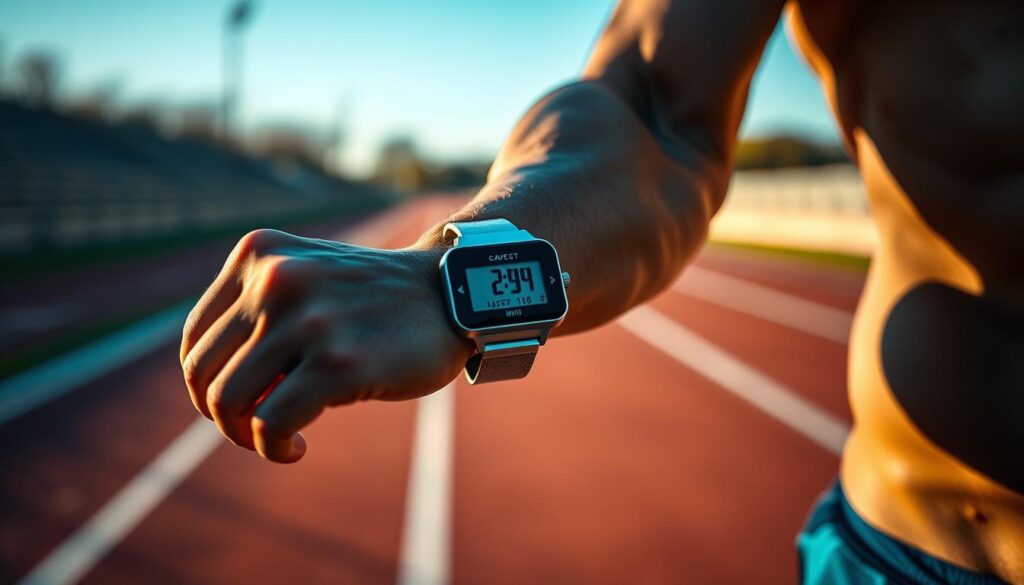Can a simple measurement like Body Mass Index (BMI) really impact a marathon runner’s performance? As we prepare for a marathon, understanding our body’s metrics becomes crucial.
The number on the scale is just one metric; it doesn’t give a complete picture of health and performance. Yet, maintaining an optimal BMI can be the difference between achieving a personal best and struggling through a race.
For endurance athletes, knowing the ideal BMI range can be a crucial step in optimizing training and performance. It’s not just about being underweight, normal weight, overweight, or obese; it’s about being in the right range for peak performance.
Key Takeaways
- Understanding BMI is crucial for marathon preparation.
- Optimal BMI can significantly impact running performance.
- There’s an ideal BMI range for endurance athletes.
- BMI is just one of many metrics for assessing health and performance.
- Maintaining the right BMI can be the difference between a personal best and a struggle.
Understanding BMI: What It Means for Us
BMI, or Body Mass Index, is key for runners. It affects how well we do in long-distance runs. Knowing our BMI helps us perform better and stay in top shape for big races.
Definition of Body Mass Index
Body Mass Index uses height and weight to measure body mass. It helps sort people into weight groups like underweight, normal, overweight, and obese. For runners, knowing this helps improve body composition for better running.
Importance of BMI for Runners
For marathon runners, the right BMI is vital. It boosts running efficiency, lowers injury risk, and increases endurance. Runners with a normal BMI have better stamina and can run longer distances.
- Enhanced Performance: A healthy BMI improves running efficiency and endurance.
- Injury Prevention: Healthy weight reduces joint stress, lowering injury risk.
- Better Recovery: Runners with the right BMI recover faster from hard training.
How BMI is Calculated
Calculating BMI is easy: just divide weight in kilograms by height in meters squared. For example, a 65 kg runner who’s 1.75 meters tall has a BMI of 21.2, which is normal. Knowing how to calculate BMI is the first step to managing it well.

Keeping a healthy BMI helps us train better, perform better, and enjoy running more.
The Ideal BMI Range for Marathon Runners
Marathon runners need to know the right BMI range for better training and performance. Studies show that the right BMI is key for success in long-distance races.
Recommended BMI for Optimal Performance
Research says the best BMI for male marathon runners is 19 to 20. This range helps runners use less oxygen, making them more efficient.
A lower BMI means better running efficiency. It requires less energy to move, thanks to less weight. This can lead to better race times.

How Weight Impacts Running Efficiency
Weight affects how well you run. Runners with a lower BMI have an edge. They carry less weight, which can make them faster and perform better.
A study in the Journal of Sports Sciences found that lower BMI runners are more efficient. They use less oxygen to run at the same pace as heavier runners. This shows how important a healthy weight is for marathon success.
- A BMI between 19 and 20 is considered optimal for male marathon runners.
- Lower BMI is associated with better running economies and improved performance.
- Maintaining a healthy weight is crucial for achieving success in marathon running.
Analyzing the Effect of BMI on Marathon Training
The link between BMI and marathon training is intricate. Studying its impact can greatly improve our training.
When we train for a marathon, knowing how BMI affects our performance is key. A study shows that runners with a lower BMI do better in long races. They use energy more efficiently and cool down better.
Relationship Between BMI and Endurance
Endurance is vital for marathon running, and BMI greatly influences our endurance. Research shows that athletes with a lower BMI have an edge. They carry less body mass during long runs.
A study on PubMed Central stresses the need for the right BMI for better endurance.
Energy Expenditure and Weight Categories
Our weight category affects how much energy we burn during a marathon. Leaner athletes, with a lower BMI, cool down better. This gives them an advantage, mainly in warm weather.
Understanding how BMI affects our energy use helps us improve our training and diet. It’s not just about reaching a certain BMI. It’s about making sure our body composition supports our running goals.
Common Misconceptions About BMI
BMI is a common tool, but it has its limits, mainly for athletes. It shows if your weight is healthy but doesn’t measure body fat. It also doesn’t tell the difference between muscle and fat.
For marathon runners, knowing BMI’s details is key. It’s not just about being in a certain weight range. It’s about what that weight is made of. A high BMI can mean you’re not overfat if you have a lot of muscle.
BMI as a Sole Measurement of Health
Using BMI alone can be misleading. For example, a bodybuilder and someone who is overweight might have the same BMI. But their health and fitness are very different. This shows why we need to look at other health measures too.
Other important metrics include body fat percentage, lean muscle mass, and waist circumference. These give a better view of an athlete’s health and fitness.
| Metric | Description | Importance for Athletes |
|---|---|---|
| Body Fat Percentage | Percentage of body weight that is fat | Helps in assessing fitness level and health risks |
| Lean Muscle Mass | Weight of muscle mass without fat | Critical for understanding athletic performance and potential |
| Waist Circumference | Measurement around the narrowest part of the natural waistline | Indicates health risks associated with excess fat around the abdomen |
Alternative Metrics for Athlete Assessment
For endurance athletes, using several metrics is better. Body fat percentage is key because it affects endurance performance.

Looking at many metrics helps athletes and coaches make better plans. This approach improves performance and lowers injury or illness risks.
Integrating BMI into Our Training Program
Adding BMI to our training is key for better performance and marathon goals. Knowing and adjusting our BMI helps us tailor our training and nutrition plans.
Diet and nutrition are vital for reaching our BMI goals. A diet full of protein and complex carbohydrates is essential. Protein builds and repairs muscles, while complex carbs give us energy.
Adjusting Diet and Nutrition for Desired BMI
To reach our BMI goals, we need to make smart food choices. Runners trying to lower their BMI should eat lean proteins, whole grains, and lots of fruits and veggies. It’s also important to watch our calorie intake to match our energy use.
“The right diet is a critical component of a successful training program. By fueling our bodies appropriately, we can optimize our performance and achieve our goals.”
Keeping a food diary is a good way to track our calorie intake and expenditure. This helps us spot patterns and areas for improvement.
| Dietary Component | Recommended Intake | Benefits |
|---|---|---|
| Protein | 1.2-1.6 grams per kg body weight | Muscle repair and growth |
| Complex Carbohydrates | 55-65% of total daily calories | Sustained energy |
| Fruits and Vegetables | 5 servings a day | Rich in vitamins, minerals, and antioxidants |
Incorporating Strength and Conditioning Exercises
Adding strength and conditioning exercises to our training boosts our performance. Strength training builds lean muscle mass, which improves running efficiency and endurance.
A good strength training program targets key running muscles like legs, core, and glutes. Plyometrics and hill sprints are also great for conditioning.
By combining a balanced diet with strength and conditioning, we can effectively use BMI in our training. This helps us get closer to our marathon goals.
Conclusion: Our Journey with BMI in Marathon Running
Understanding BMI is key for marathon runners. It helps them know their weight status. This knowledge guides their training and nutrition.
Optimizing Performance with BMI
A healthy BMI is vital for top marathon performance. It boosts running efficiency and lowers injury risk. For more on BMI, check out our BMI calculator for men.
Key Takeaways and Resources
BMI is crucial for marathon runners. It quickly shows their weight status. Runners can improve by adjusting their diet and adding strength exercises to their routine.


